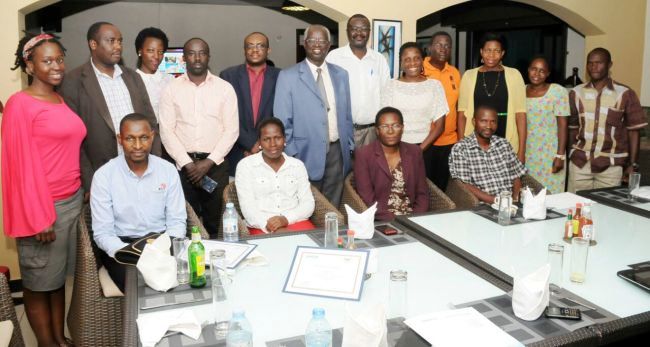The pioneer One Health Residency Program in Africa has successfully been completed at Makerere University under the auspices of the College of Veterinary Medicine, Animal Resources and Biosecurity (CoVAB). The former residents comprising 2 Veterinarians; Dr. David Muwanguzi, Dr. Shamilah Namusisi, and one nurse, Ms. Jacinta Waila (in absentia) received their postgraduate certificates of completion during a ceremony held in Kampala on 1st April 2015. Following a rigorous and highly competitive interview process, the residents were selected in 2012 to undergo this 2-year unique residency, the first of its kind in Africa.
Hosted by the College of Veterinary Medicine, Animal Resources and Biosecurity (CoVAB), the One Health Residency was modelled along the lines of a Veterinary Public Health Residency Program offered by the University of Minnesota, where a team from CoVAB travelled to receive first-hand experience on how to run the program at Makerere. However, the program was upgraded to a One Health Residency to accommodate not just veterinarians, but other professionals in the health sector.
 CoVAB and the School of Public Health, College of Health Sciences (CHS) are members of One Health, East and Central Africa (OHCEA), which was instrumental in funding the residents during their stay on the program.
CoVAB and the School of Public Health, College of Health Sciences (CHS) are members of One Health, East and Central Africa (OHCEA), which was instrumental in funding the residents during their stay on the program.
Recruits on the One Health Residency program are mentored to become One Health practitioners through applied, problem-based training. The program targets a combination of early- to mid-career health professionals such as Veterinarians, Nurses, Public Health specialists and Medical Doctors to work as a team while applying general knowledge towards complex health challenges. They are expected to participate in One Health projects comprising “practice” or “clinical” component in industry, government agencies, intergovernmental agencies and university faculty. The residents are also required to get a service component of 75%, working with the private sector, public sector & academia on competency based projects and an optional 25% towards an advanced degree for those who need academic growth. All the 3 residents enrolled for a Masters’ degree and are currently in the process of completing them. Dr. Namusisi and Ms. Waila enrolled for a Masters in Public Health while Dr. Muwanguzi, opted for a Masters in Infectious Diseases Management at Makerere University.
 Speaking at the ceremony, Dr. Shamila Namusisi said that the residency program was a turning point in her life. “I needed something fresh to rejuvenate myself to go back to communities and the Residency Program did it for me. Not only has my thinking and approach to issues changed,butI have also made a lot of connections, acquired skills and stepped beyond my comfort zone”, Dr. Namusisi noted.
Speaking at the ceremony, Dr. Shamila Namusisi said that the residency program was a turning point in her life. “I needed something fresh to rejuvenate myself to go back to communities and the Residency Program did it for me. Not only has my thinking and approach to issues changed,butI have also made a lot of connections, acquired skills and stepped beyond my comfort zone”, Dr. Namusisi noted.
Both Dr. Namusisi and Dr. Muwanguzi appealed to OHCEA to give an opportunity to as many professionals as possible to undergo this unique program, which according to them, is different from the one-way education system that is offered to students at University.
Prof. Francis Ejobi, the in-charge of the program at CoVAB explained that since this was the pioneer program, a lot of challenges were met but at the same time, a lot was learnt and that enough experience was therefore gained to make the next phase even better. “We hope to attract more residents and are looking into alternative funding for the second phase of this project,” he said.
 The program Manager OHCEA Uganda, Dr. Geoffrey Kabagambe congratulated the residents upon the successful completion of the residency program. He encouraged them to document their experiences for purposes of promoting acceptability and understanding of the program within the University and beyond.
The program Manager OHCEA Uganda, Dr. Geoffrey Kabagambe congratulated the residents upon the successful completion of the residency program. He encouraged them to document their experiences for purposes of promoting acceptability and understanding of the program within the University and beyond.
Dr. innocent Rwego, the representative from the University of Minnesota noted that his university was still interested and committed to supporting the residency program. He was also happy to note that unlike in 2010 when the University of Minnesota first approached CoVAB, the residency program has gained a little more acceptance and understanding within the College.
Dr. Kabagambe expressed optimism that under the new One Health Task force project, there is hope for further funding of the One Health residency program, which he said should be evaluated and findings used to assess its impact.
The Deputy Principal CoVAB praised the One Health Residency Program for producing well rounded professionals with a lot of skills that undergraduate students at the University usually lack at the time of graduation.She urged the former residents to be available when called upon in regard to propelling this program further since it has immense potential to contribute to Makerere University’s internationalization agenda.
Article by Ms. Jovia Musubika Kavulu, College of Veterinary Medicine, Animal Resources and Biosecurity

 General1 week ago
General1 week ago
 Natural Sciences1 week ago
Natural Sciences1 week ago
 Agriculture & Environment7 days ago
Agriculture & Environment7 days ago
 Health2 weeks ago
Health2 weeks ago
 Health1 week ago
Health1 week ago



